Sam Altman: How to form a start-up team and culture?

Stanford course CS183B: How to start a startup . Started in 2012 under the leadership of Peter Thiel. In the fall of 2014, a new series of lectures by leading entrepreneurs and Y Combinator experts took place:
Second part of the course
First part of the course
- Sam Altman and Dustin Moskovitz: How and why to create a startup?
- Sam Altman: How to form a start-up team and culture?
- Paul Graham: Illogical startup ;
- Adora Cheung: Product and Honesty Curve ;
- Adora Cheung: The rapid growth of a startup ;
- Peter Thiel: Competition - the lot of losers ;
- Peter Thiel: How to build a monopoly?
- Alex Schulz: An introduction to growth hacking [ 1 , 2 , 3 ];
- Kevin Hale: Subtleties in working with user experience [ 1 , 2 ];
- Stanley Tang and Walker Williams: Start small ;
- Justin Kahn: How to work with specialized media?
- Andressen, Conway and Conrad: What an investor needs ;
- Andressen, Conway and Conrad: Seed investment ;
- Andressen, Conway and Conrad: How to work with an investor ;
- Brian Cesky and Alfred Lin: What is the secret of company culture?
- Ben Silberman and the Collison Brothers: Nontrivial aspects of teamwork [ 1 , 2 ];
- Aaron Levy: Developing B2B Products ;
- Reed Hoffman: On Leadership and Managers ;
- Reed Hoffman: On the leaders and their qualities ;
- Keith Rabois: Project Management ;
- Keith Rabua: Startup Development ;
- Ben Horowitz: Dismissal, promotion and reassignment ;
- Ben Horowitz: Career advice, westing and options ;
- Emmett Shire: How to conduct interviews with users;
- Emmett Shire: How to talk to users in Twitch ;
- Hossein Rahman: How hardware products are designed in Jawbone;
- Hossein Rahman: The Design Process at Jawbone.
Disclaimer: caution, traffic (bulk material + lecture slides).
')
Sam Altman: Idea, Product, Team, Implementation - Part II
Before going to the beginning of today's lecture, I would like to take a couple of minutes to answer your questions. At the last lesson, we did not have time for you to ask them, as some of you have already noticed in correspondence with me. So, if you have any questions about what we analyzed last time, I will be happy to answer you.
Q: Are there any ways to determine the current rate of growth of the market and its forecasting, for example, for the next 10 years?
The fact is that students have a big advantage here. You just need to trust your gut. Your more adult colleagues can only guess what technology is used by young people, but you can just look at what you and your friends are using. From this point of view, you will have a much clearer perspective than those who are older than you. I would say this - trust your instinct. Take note of what you do and what you use. Take a look at what people around you use, people of your age. These technologies, most likely, have a future.
Well, one more question, and we will begin today's lecture.
Q: How do you manage to cope with fatigue [orig. burnout - emotional "burnout" - hereinafter approx. transl.] and work productively if available?
You can answer this question very simply: “it's terrible, but you need to overcome yourself.” In this case, you can no longer hide behind your students, disclaiming responsibility for getting good grades on exams because of your emotional overload. This is one of the most difficult aspects of working on your own project - you face the real world, and you just need to cope with your problems. A canonical way out of this situation would be a vacation trip, but this never works in the case of company founders. In any case, all your thoughts will be only about work, even though it is not very easy to believe at first glance.
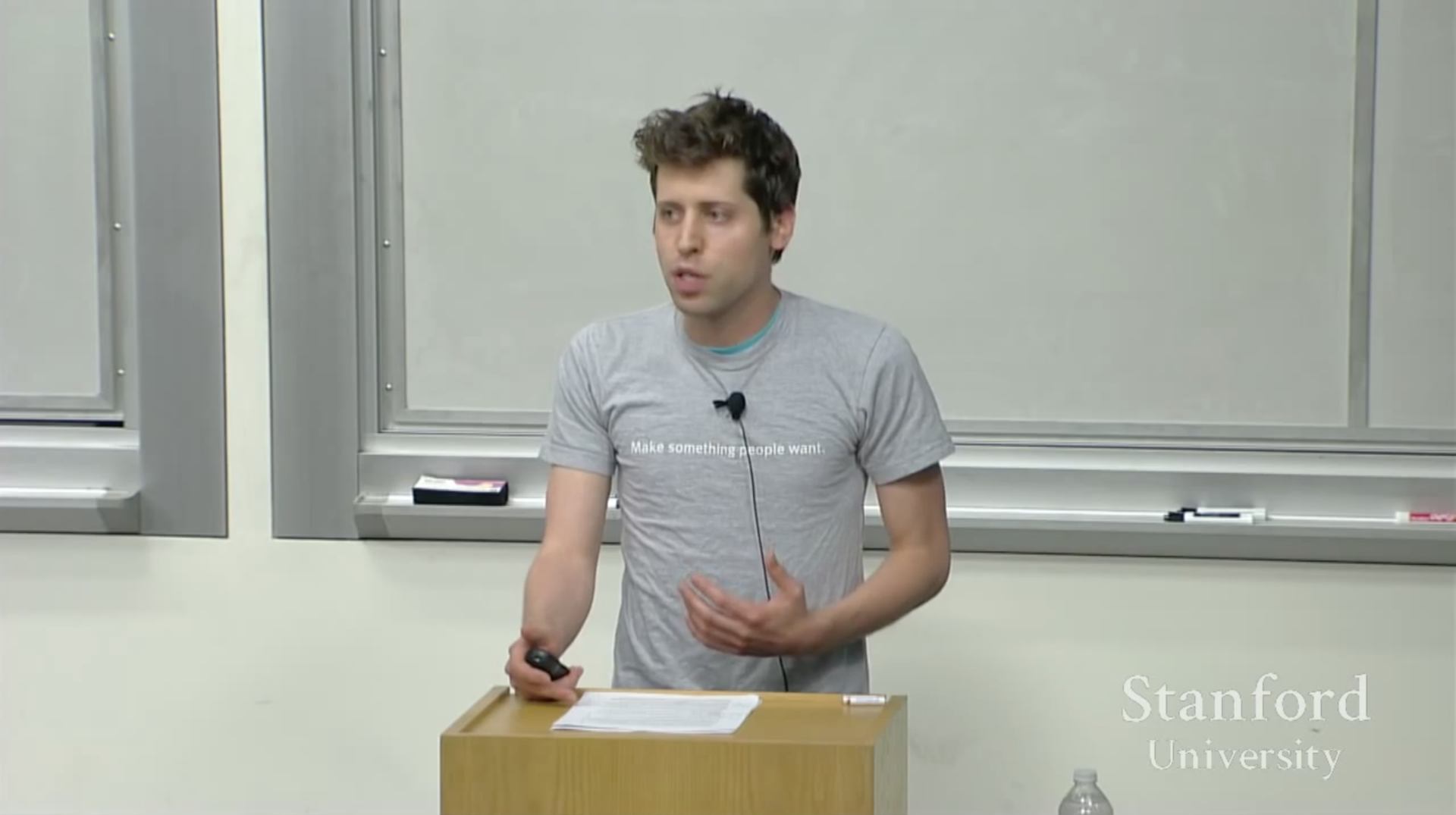
So just pull yourself together.
Of course, you will be helped by the support of colleagues, the importance of which should not be underestimated. The emotional component of work, especially depression, is not a joke, and the presence of a dedicated team in any case will not be superfluous. However, the only way to get rid of emotional fatigue is to identify it and work with what you do wrong in dealing with challenges. In the end, only this will make you feel better.
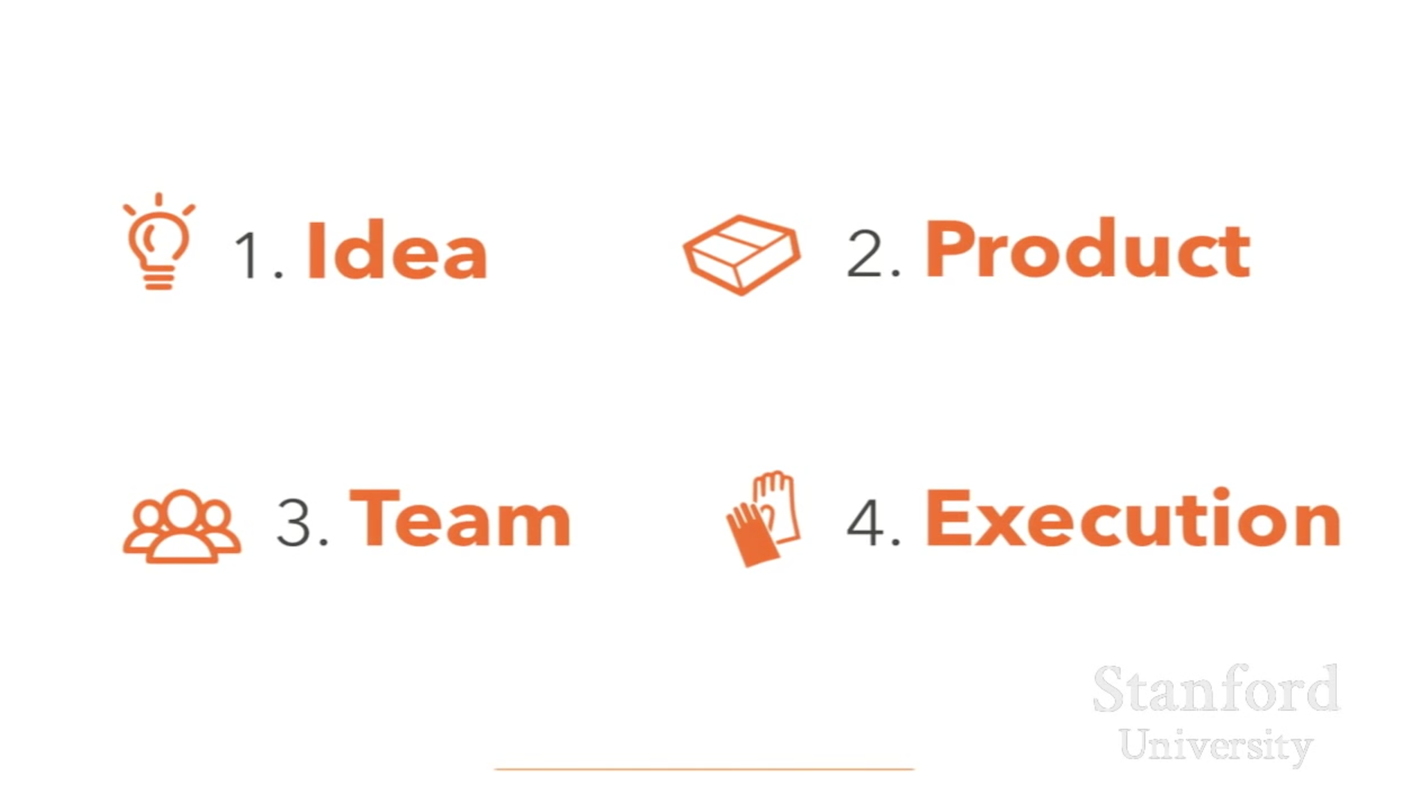
In the first lecture, we discussed working with ideas and product. I would like to emphasize once again the following: if you fail at this stage, then nothing will save you. Today we will talk about working with employees and the actual implementation of your project. I hope that you will succeed [orig. Hopefully you don't execute the people you hire. Sometimes - a game of words based on the translation of the word execute in a different context].
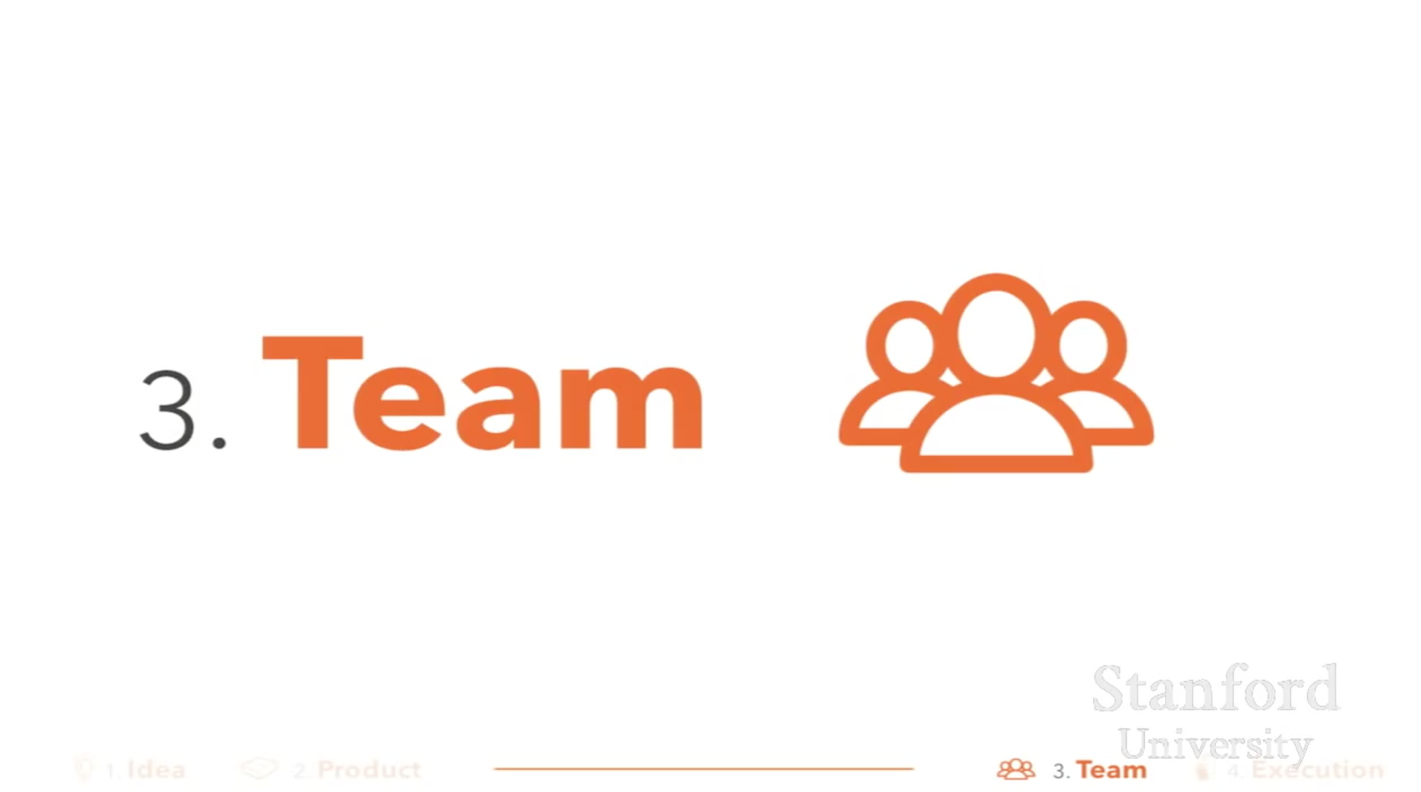
First, I would like to dwell on the co-founders of the company, whose relationships underlie the entire business. Usually everyone says that one should pay attention to the signs of incipient stress and immediately work with them. Of course, this makes sense, and in the case of YC residents, the first reason for the termination of the existence of companies is precisely the differences between the co-founders of the business. However, many still approach the issue of team formation much less thoroughly than the issue of hiring employees. Do not even think in the same way! This stage is one of the key moments in the life of your project. Treat these issues properly.
For some reason, this is very hard for students. They just take the first comers, based on the general desire to do business. But there are still different kinds of events to get to know your potential co-founders. All this is just insane. They would not even have hired those people who were chosen as co-founders, but nevertheless decided to start working with them on a common cause. This is very, very bad. Whether it is a random person, or someone whom you know only superficially - usually all this ends in a catastrophe, because in difficult times you will have nothing to rely on, because you have practically nothing in common.
Well, if you met with the co-founder of your project in college, but if this did not happen for one reason or another, and is not foreseen, you just have to go to work in an interesting company. If you work, for example, in Facebook or Google [well, or in Yandex, and maybe in Mail.ru], then you just open a “gold mine” to search for potential co-founders. No worse than Stanford.
It is better to work without a co-founder than to get along with the wrong person. However, working alone is in any case not the most optimal strategy. Before we started talking, I looked at our statistics. Maybe I missed some one company due to a quick calculation, but it seems to me that all the companies from the 20 YC graduates with the largest capitalization were founded by at least two people. And it seems that we are investing only in one of ten companies created by the efforts of one single founder.

So, the best option is a co-founder that you know well. Another good option is to work alone. The first one as a co-founder is a terrible option, but nevertheless, for some reason, students often choose him.
Reflecting on potential co-founders, it is worth starting from certain criteria. In YC, it is customary to take exceptional resourcefulness as such a criterion, and everyone has heard about it. Your co-founders really need this quality. There is an even more colorful example that we share at the beginning of the YC program. It was first demonstrated by Paul Graham, and I continued the tradition.

You need calm and persistent colleagues who will be willing to make their own decisions in certain situations. They must act quickly, decisively and approach this creatively, be prepared for anything. There is a similar pattern in pop culture. Of course, this sounds silly, but well remembered. We tell every recruitment of YC residents about this, and I think it helps them.

This sample is James Bond. It sounds ridiculous, but you just remember the qualities that will help you in finding a co-founder. And the quality of James Bond in this case is more important than expertise in a particular area of expertise.
As I said earlier, the ideal option is the co-founders whom you have already known for years. This approach is also suitable for attracting the first hired employees, and many people use it just in this case, but they completely forget about it at the moment of choosing the co-founders. So take the opportunity to get to know your fellow students, this is your advantage.
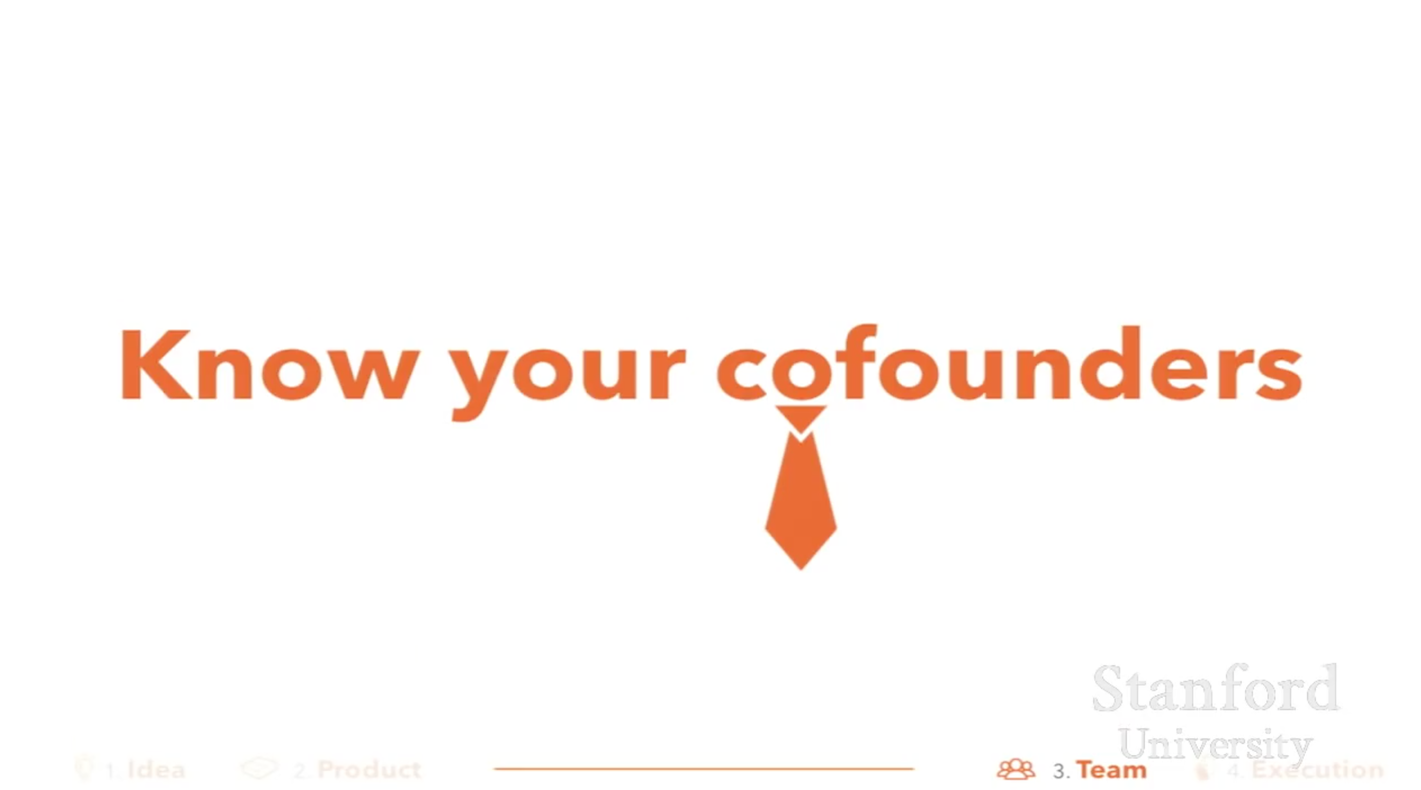
In addition to exceptional resourcefulness, it is worth noting such qualities as stamina and tranquility. The need for these qualities, as well as the availability of intelligence, is obvious, but many do not give them enough weight. You will need a co-founder with these qualities, especially if they are not very pronounced.
If you do not understand technology, and even if you understand, in any case, you should be considered as a potential co-founder of a person with technological specialization. The replacement of such specialists by hired employees is a popular solution today, but rather strange. Everyone is confident that they will be just managers.
Our experience shows that this approach does not work. Software specialists [software] should be engaged in relevant business, and media experts should work on the project in the media field.
We believe that two or three co-founders of a business are the best option. One is not the best, five is just a terrible option. Sometimes it works out and four partners, but it is better to concentrate on a team of two or three.
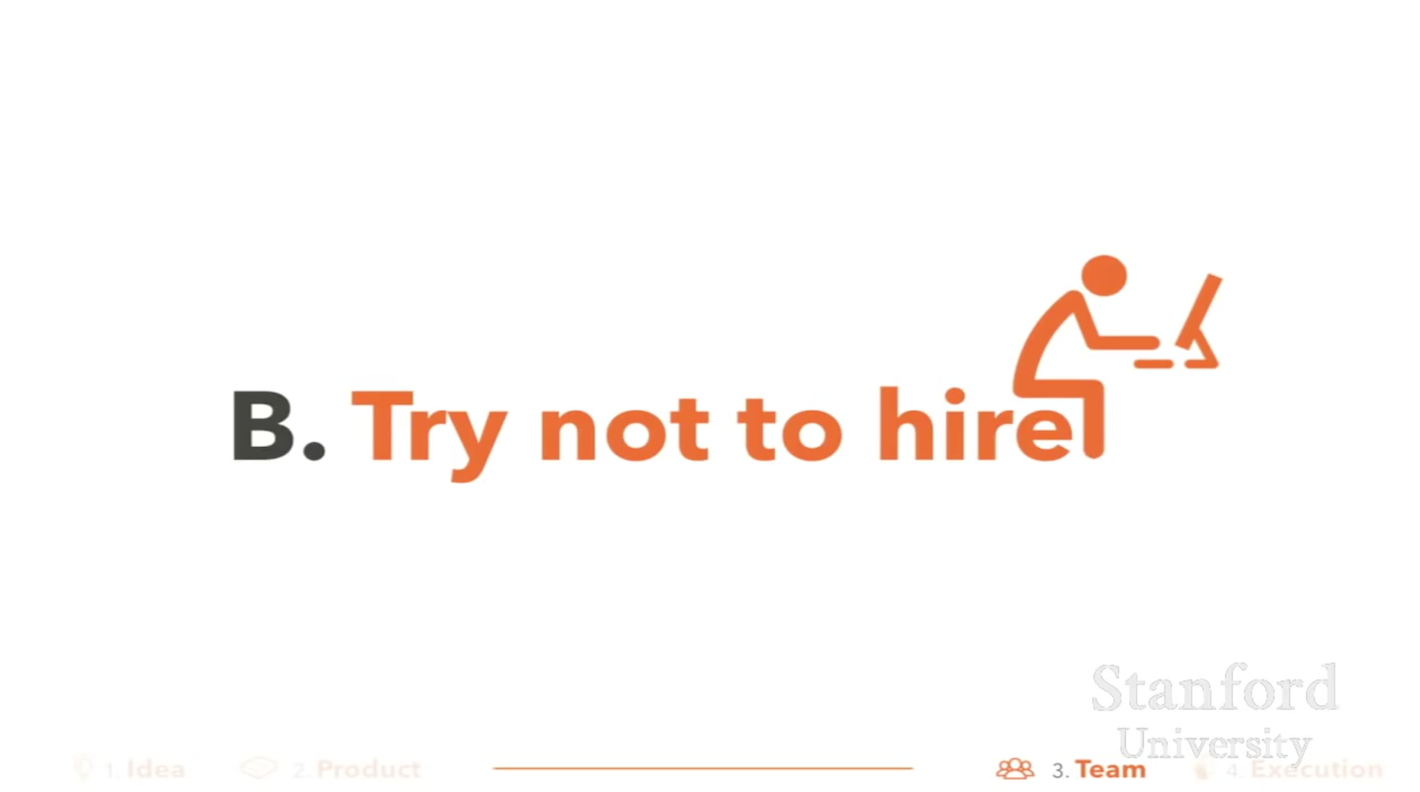
The second aspect of the formation of the team: try not to resort to the help of hired employees. Starting work on a project, you will notice that you will be constantly asked about their number by your team.
For this metric your project will try to evaluate on the subject of coolness. If you talk about a significant number of employees - everyone will be amazed at the prospects of your business. Otherwise, you will look like a rather miserable project in the eyes of the public.
However, in fact, the minimum number of employees is a huge plus for the company. An enumeration of their number usually leads to too high spending on wages [orig. burn rate - in fact, the speed of "burning" funds], complicating the structure of the company, slowing down the decision-making process, etc.
There is nothing good about it.
It should be proud of the opportunities that you create for your business, attracting a small number of hired employees to work. Many YC residents have distinguished themselves in this as part of their first year of work. Some did not at all resort to hired labor. Try not to expand your team as much as possible. At an early stage of work, you should hire employees only when you are critical. In the course of developing your business, you should learn to do it quickly - to be able to scale it, but at first it is better not to hire employees.
One of the reasons for the refusal of "mercenaries" is the high probability of an error when choosing a candidate for a job in your company. In fact, as my experience with many teams shows, such a mistake in the early stages of project development simply kills the entire business.
The guys from Airbnb interviewed the first employee of the company as much as 5 months. In the first year of their work, they hired only two. Before hiring the first, they made a list of qualities that they would like to see with their first employee. One of the qualities required was a total immersion into the Airbnb business. They did not hire those who would not be willing to devote all of themselves to the business of the company.
Illustrating the strict attitude to this issue of Brian Chesky, Airbnb Director, I will say that he even asked people about their decision to go to work at Airbnb in the event of a fatal diagnosis. Having begun, it seems, from one year as the remaining lifetime of a potential employee, he gradually moved to 10 years, taking into account the insanity of his question. However, he is still asking this question.
The approach to hiring employees is really important, because these people will be called upon to determine the essence, appearance and future of your company. You will need those who believe in it almost as much as you yourself. Of course, Brian's question sounds crazy, but he managed to develop a culture of incredible devotion to his work. It is this culture that helps unite the company in difficult times for it. For example, during a crisis at the initial stage of business development, the entire company actually lived in an office - they worked on the product and improved it until they had overcome a local crisis.
Amazingly, the first 40 (or so) Airbnb employees feel personally involved in the foundation of the company [in fact, literally and figuratively].
The high level of requirements and the lack of haste in the process of recruiting employees - a guarantee that they will believe in the mission of your company, working with you.
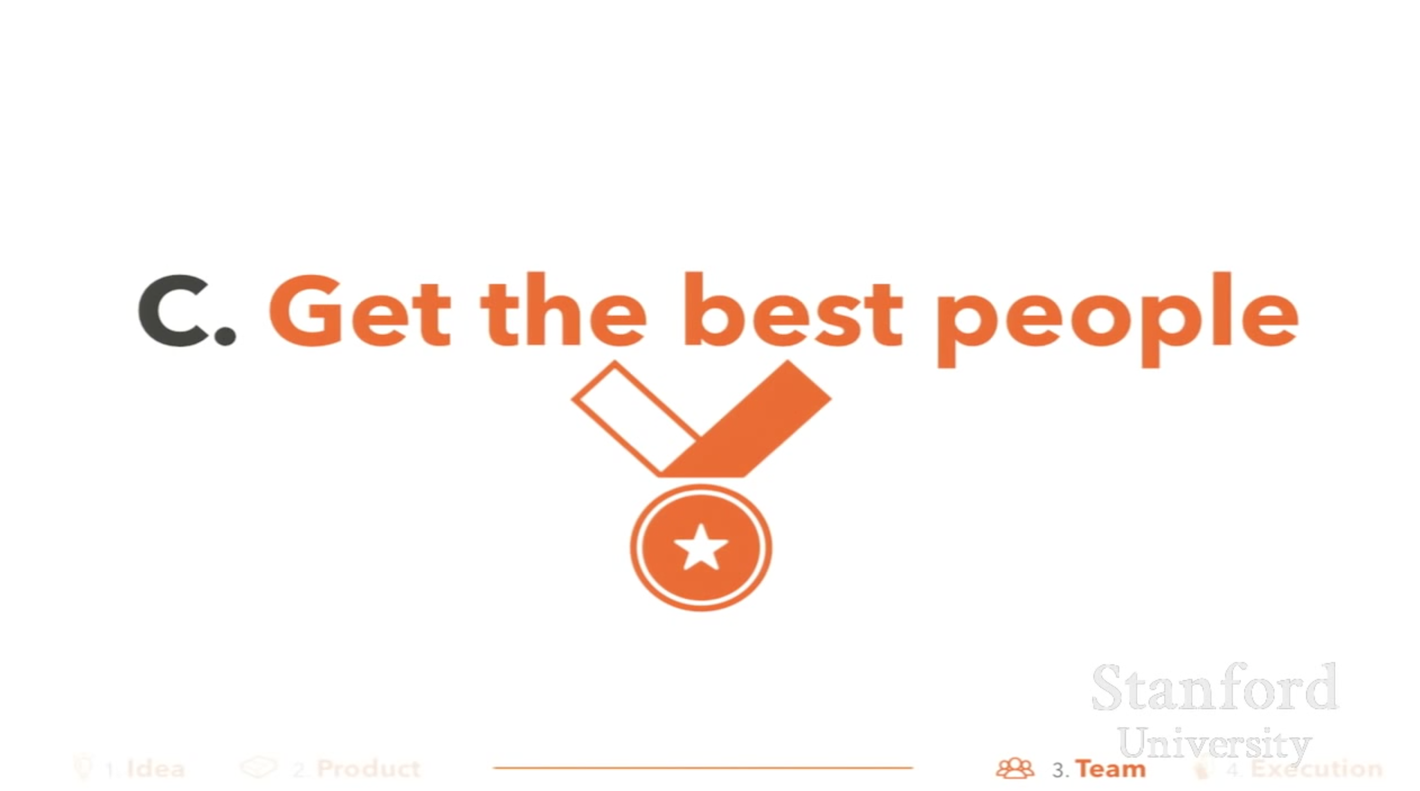
Suppose you take into account the note about hiring employees only when such a step is critical. When such a need arises - you can not be distracted by any other tasks other than the selection of the best candidates. As with the dense work on the product, your main priority is the product, and in the process of attracting investments, the priority should not shift to other tasks than attracting investments.
Company founders often underestimate the complexity of the recruitment process. It seems to them that the genius of their ideas will serve as a magnet for volunteers. Of course, it all works in a completely different way. Due to the fact that the most talented candidates have the opportunity to choose their place of work among a large number of companies, their involvement will take time, sometimes up to a year. This is not a very fast process, in which you will need to convince them of the greater significance of your company's mission compared to the others.
This only confirms the importance of working on the product and its quality. Masters of their craft always want to take a place in the team of a spacecraft, and not anything else.
I always advise those who wish to join the start-up team - to choose just a spacecraft - a company that is already in full swing, but almost nobody sees its potential. In addition to you - a man who closely looked at this company.
Good specialists understand this very well and will not be in a hurry to join the team of your company. First of all, they will try to make sure that you are on the right track.
This morning I was asked a question about the amount of time that should be given to the selection of potential employees. I would say that it is worth doing from zero to a quarter of the time that you spend working on your project. At the same time, either you do not hire any staff at all, or it takes the maximum time segment compared to other tasks.
In fact, in the management literature they talk about allocating 50% of the time to select "mercenaries", but the authors of such a conclusion rarely even spend 10% of their time on such tasks. In any case, 25% is a significant time, and about as much should be spent on personnel issues.
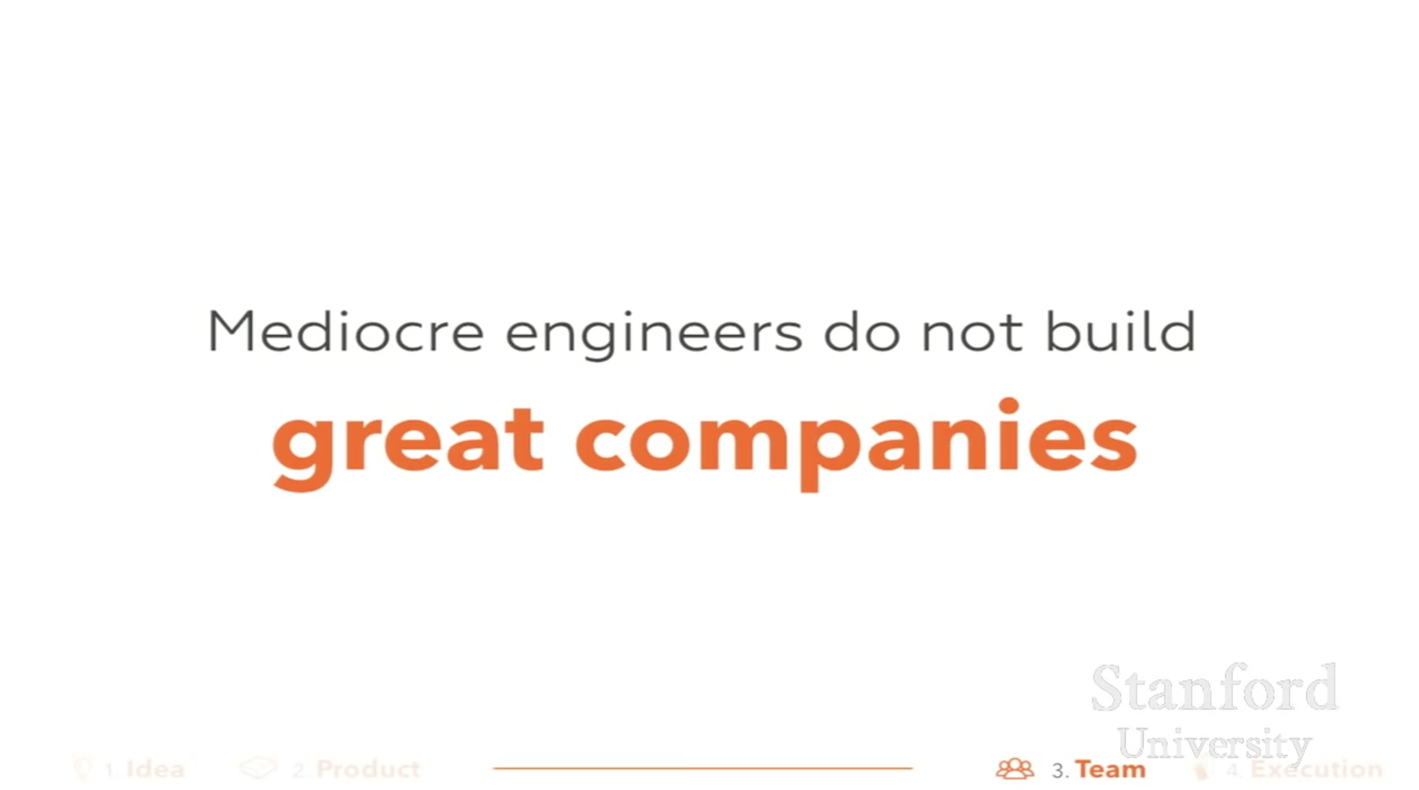
Compromise or mediocrity - your enemies in this matter. We always talk about it, but few people are fully aware until he steps on this “rake”. Mediocrity is a quality that destroys a company's culture. In large companies, it can cause serious trouble, but not kill the company itself. As part of a small startup, the result of its impact is much worse.
As an example, I will say that one of my friends even installed a special sign in the meeting room, which he uses, including for interviews. This sign reads:
"Mediocre engineers do not create great companies."
In a large company, you can still somehow deal with this, but in a startup, absolutely everyone sets the tone for work. If you make a mistake at the stage of receiving the first 5-10 employees to work in your company, the probability of killing your business increases significantly.
Can you put the future of the whole company on a single employee? Thus, it is worthwhile to approach the selection of each of the candidates at the initial stage of development. In the future, as the business grows, a compromise is also possible due to circumstances. In the framework of the following classes, our experts will just talk about the subtleties and differences of the theory and practice of working with personnel. However, in the early stages of the company's work, it’s worth remembering all this and not failing.
Sources where candidates come from. This is another thing that students often misinterpret. The best source of hiring employees is your social circle, people you already know and those who are known to other employees of your company. The first hundred or more employees of most successful technology companies were selected on the basis of personal recommendations. Despite the awkwardness, most of the founders turn to all their acquaintances, whom they consider to be suitable candidates, and ask their employees to do the same. If you worked on Facebook or Google, you would know that in the first few weeks you will certainly be interviewed by an HR specialist who will force you to name all the smart people from your surroundings, so that later, if necessary, to hire someone from them.
Personal recommendations are the key to hiring employees.
Another approach is to search for candidates outside the Valley. Trying to hire local techies is a thankless job, but you probably know people who live somewhere else and would like to work with you.
Experience and how important it is for employees to have is another question that the founders often ask us. The short answer is: experience is important for some positions and less important for others.
When you hire someone who will manage a large part of your organization, perhaps the candidate’s experience will play a significant role. But for most of the posts that you close in the early stages of a startup’s life, experience is usually not so important - you should pay attention to the candidate’s abilities and his belief in what you are doing. Most of the best employees I have ever hired have never occupied the required positions. Therefore, you should ask yourself how important the experience is when you hire an employee for a particular position. In most cases, especially in the early stages of the company's life, you will come to the conclusion that the candidate’s experience is not important to you.

There are three things that I pay attention to during the hiring process:
- How smart is the candidate?
- Does he bring things to the end?
- Is he interesting as a person?
And if receiving his answers, I can answer all three questions in the affirmative, then I do not regret making a decision. Almost always this approach works. You can find the answers to all these three questions already at the interview stage, but the best way to answer them is to work together. Therefore, ideally, someone who you have worked with before will suit you - in this case, the interview will not be required.
If there are no such candidates, then, I believe, the best way out of the situation is to work with the candidate on the project a day or two before hiring him. Both of you will learn a lot - most of the founders who did not have the experience of creating companies are very bad interviewers who, at the same time, can appreciate someone very well by working with this person together.
So, one of the tips we give at YC: try to work together on a project instead of an interview.
If you are going to have an interview, and you most likely want to do this, ask the candidate to tell in detail about his past projects instead of letting him solve the puzzles. This way you will find out more about your candidate.
For one reason or another, young techies like to give puzzles to candidates instead of asking the person what he has done in his life. Carefully study the projects on which the potential employee worked. Ask for recommendations. This is another thing that inexperienced founders often miss.
You need to call the people with whom your candidate worked. And during the call, you need not just ask how the project was working - you need to ask about something besides that. Ask the interviewee if your potential employee belongs to 5% of the people with whom the interviewee was the most comfortable to work with. What exactly did this man do? Would your interlocutor hire him again?
I stress once again: focus on the request for recommendations.

Another point that I noticed when communicating with companies from YC is that the developed communication skills correlate with the successful hiring of employees.
Previously, I did not pay enough attention to this. We will talk about why communication is so important in the early stages of a startup’s life. If it is difficult to communicate with someone, if someone cannot clearly state his thoughts, the likelihood that this person will be able to work effectively will be extremely low.
In addition, as your first employees, you will certainly want to see people who can demonstrate their ability to take risks. To some extent, this ability already exists in them - otherwise they would not have shown interest in working in a startup, but now startups are a kind of fashion trend, so pay attention to people who really like to take a little risk.
If someone chooses between work in your startup and McKinsey, it is extremely unlikely that this person is really going to work in a startup.
You also need those who are obsessively obsessed with your idea - and this is a little different from a relaxed attitude to risk. So you should look for a combination of these qualities.
There is a famous test from Paul Graham, which is called “Who are you in the animal world?”. The point is that for each of your employees, taking into account the work that he does, you must find the equivalent of the animal world. I don’t know if this can be adequately translated from English, but you need irrepressible comrades [Eng. unstoppable]. You need those who will complete the work. Founders, satisfied with their first employees, usually describe them as the best professionals in their field.
Mark Zuckerberg once said that he was trying to hire those:
- with whom he would be comfortable to communicate outside of work,
- and to whom he would be pleased to report, if the roles have changed.
I think this is a very good model. You do not have to make friends with each of your employees, but you should at least be pleased to work with them. And the friendship does not develop, then you should at least deeply respect them. And again, if someone is not very interesting to you, then do not try to do something about it.
As soon as I talk about hiring, I would like to pay attention to the topic of distribution of shares in the company among employees. The founders do not pay enough attention to this issue.
I think, as a rough estimate, you should plan the distribution of about 10% of the company among the first ten employees.
Be that as it may, they must earn this share in four years, and if their business goes uphill, they will bring companies much more benefit. They will increase the value of the company many times, and if this does not happen, after four years they will not be in the project.
One way or another, the founders usually very sparingly distribute shares in a company among employees. However, they are very generous to investors. I think you need to do the opposite. I think this is one of the most frequent mistakes of the founders. Over time, employees will add more value to the company. Investors, as a rule, simply write a check, and then, despite a lot of promises, they do not fulfill them. Sometimes they do it, but your employees remain the ones who have been building your company for many years.
Therefore, I am sure that it is necessary to bargain with investors for reducing their share and to be as generous as possible with employees. YC , , , .
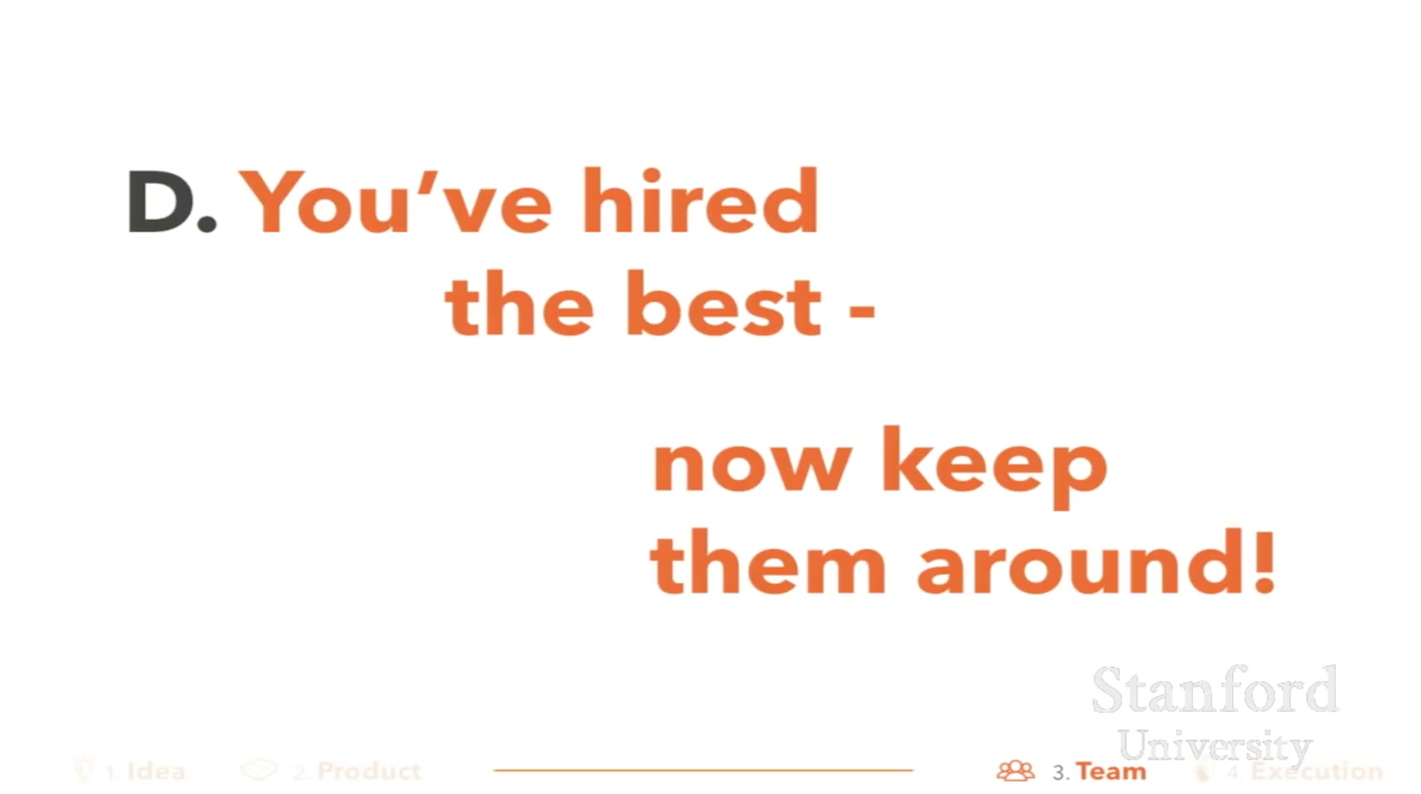
, . , , , .
, . , . , , , – .
: , CEO, , , . YC , , , . - , , :
« , , , , ».
– , – . , – , . , .
- . , . , .
– . . , , , – , .
, , : , .
, , , . , . , .
– , - , , . , .

, . , -, . , , , – . , , , .
, , . – , . . . , .
, , :
- ,
- , .
, . – , . – , ( ), . .
, , ?
: , , . , , , , , .
, - , , . – , , , . , , . - – , .
, , . , , , , , – .
- ?
– , - – - . , « ».
, . , .
. - – - – , , , -. , , . , .
( ): , - ?
, , . , , . , , , .
- , 50 , , . – , .
: , ( ) -?
, -, , , , . , -, , .
- , , , . (4 ) – , , , 50:50, , . . , , 25% , , 50% .
, , , , – , - .
, : .
, , , . , – - .
, ?
– , . , . , , , .
.
: - ?
: . , , , . : , , 30 , - – [ , , Basecamp].

, . – , . - , , , .
, - , – .
, – . , , . , , . , , , – .
There is no other way. COO, , . . , , , .
, , .
– , , . , .

, CEO.
, CEO. , CEO . , , CEO:
- ,
- ,
- , , , , , ,
- .
, . , , , , , CEO, , , .
:
- .
– , , , , . : . – . , . , .
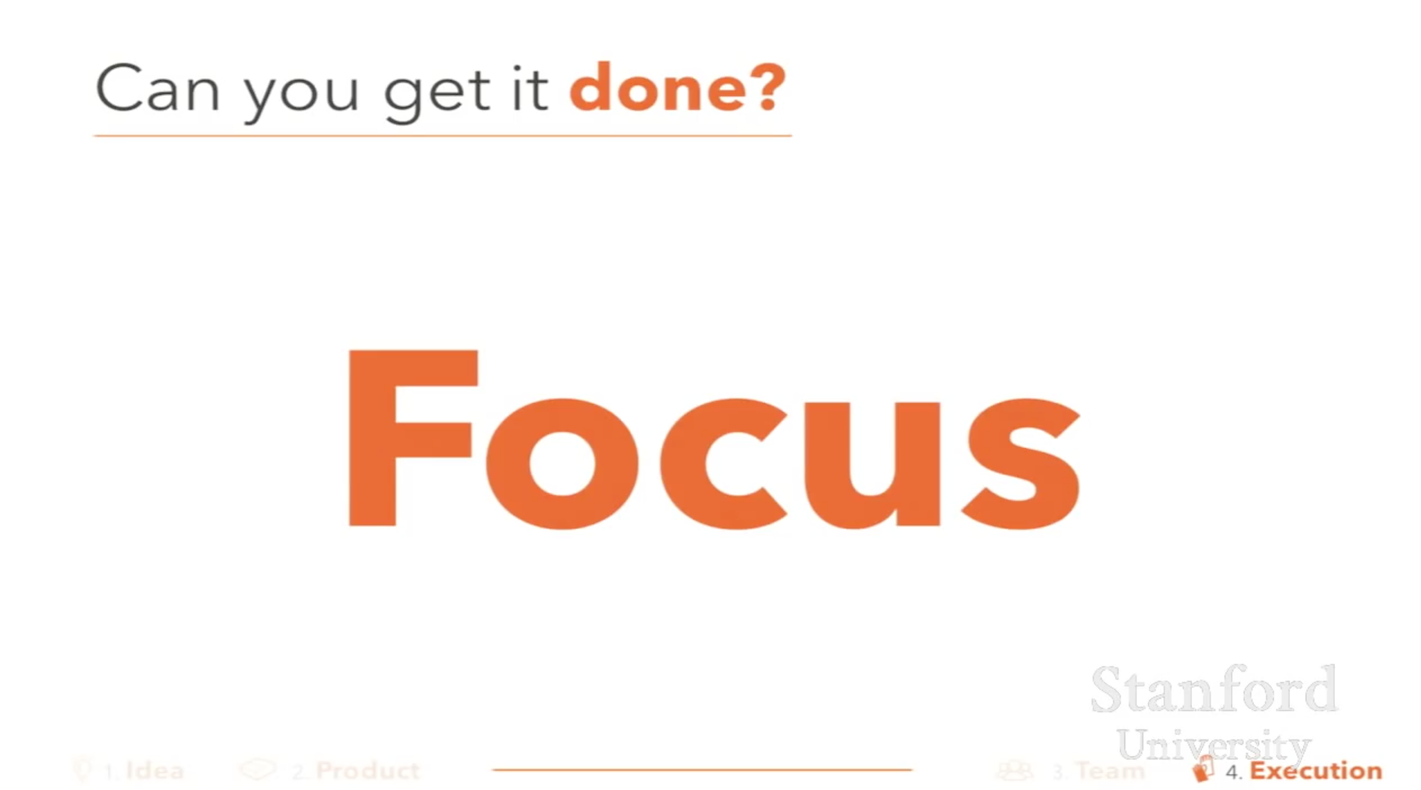
– , . , , , . , , , , , , – .
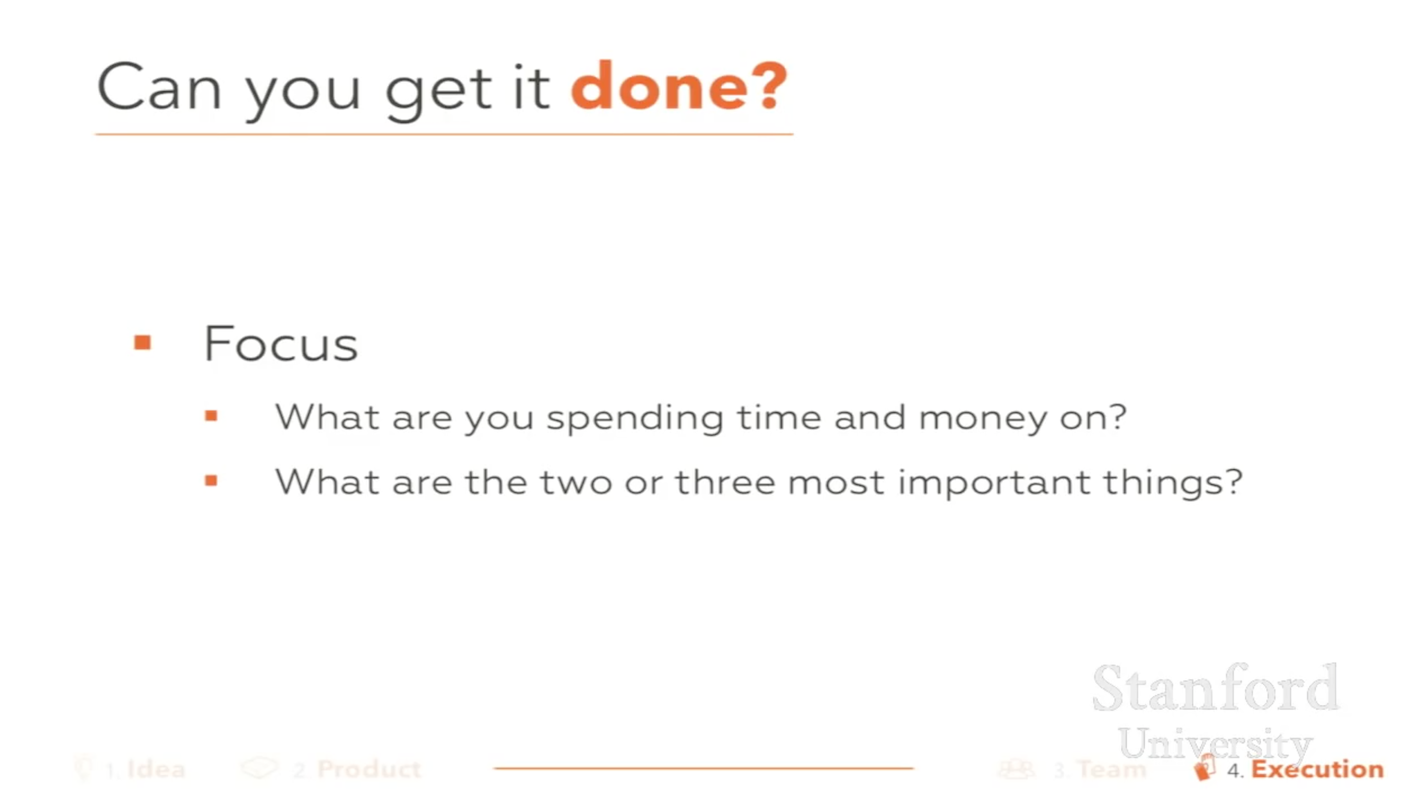
, , , , . .
, . . - , . – .

, . «» 97 100. , . . , , .
One of the great and terrible truths about how to create a startup, is that you do not get anything for trying to do something. You earn points only when you do what the market wants. Therefore, if you work hard on what the market does not need, nobody will care.
The question is how to understand what to focus on day after day. It is very important to set goals every day. Most of the successful founders with whom I am familiar form a series of small goals covering all of the company's business, which all members of the team know about.
Such goals may include, for example, supplying a product by a certain date, achieving specific growth rates, hiring employees for specified key positions - at any time each member of the team can say what these goals are. And each builds their work with these goals.
The founders set the direction for the work of the whole team. Whatever the founders care about, whatever they focus on, it will be the direction of the entire company. The best founders repeat their goals to themselves again and again, much more often than, in their own opinion, they should be necessary. They put up posters on the walls, talk about them in face-to-face meetings with team members and in common weekly meetings with the entire company.

And this allows the project not to leave the course. One approach to determining the direction of its development is that concentration is unattainable without effective communication (this is why co-founders who are not friends often face difficulties). Even if only four or five people work for you in the company, a small divergence of opinions and lack of communication leads to the fact that people start working on slightly different tasks. And then the concentration is lost, and the company has to get out of the current unpleasant situation.
I will talk about this a little later, but development and growth rates are something that you just can’t stop concentrating on. These are things at the expense of which the startup lives, and you must constantly support them. You should constantly be aware of how your real indicators correlate with metrics, every week you need to review the work done - you should seriously worry if you want to say:
- “Now we are not growing very fast, but we are busy with other tasks”
- “We do not have an X delivery schedule because we are focused on other matters”
- "We are doing rebranding, and so do."
This almost always leads to disaster.
So, you need to set the right metrics, and you need to concentrate on growing relative to these metrics and maintaining growth rates. Do not let the company get distracted or addicted to other things. The error of most companies is that they are too fixated on their own progress. It is very easy to do promotion, which does not give any results, but it also gives a sense of self-worth. If in a year you do not achieve anything, it will not be so cool, especially if you continue to think only about last year's articles, in which your startup is called a new breakthrough, despite the fact that in reality you have not done anything new.
As I said, assemble the team in one place. Remote start-up work is very, very hard. It slows down your development more than anything else.

Work hard. A friend of mine told me that the secret of a startup’s success lies in its extremely strict adherence to goals and exceptional dedication. You can work in a startup and do something else besides this, for example family, but you cannot work in a startup and still do a lot of other things. A startup is not the best choice to ensure a balance between work and personal life - this is the harsh reality. There are many good things in startups, but this is not their forte. This is such an all-consuming activity that its scale within your life is difficult to even put into words, because first of all you need to strive to work more competitors.
The good news is that a small amount of extra work on really important things leads to radical changes for the better. I like to use as an example the viral coefficient for custom web projects. How many new users does one existing lead to? If this figure is 0.99, the company will eventually wither and die. And if it is 1.01, you will find yourself in a zone of continuous exponential growth.

This is a concrete example of the fact that between success and failure lies only a small concentration of efforts. When we talk to successful entrepreneurs, they constantly tell similar stories. Their success ensured that they simply worked a little better and more than their competitors.
You should concentrate well. The key persons in this matter are the director and founders of the company. The main advantage of a startup is the speed of implementation of the product, and you just need to learn how to maintain a relentless working rhythm.
The famous Facebook slogan reads: “Grow fast and in spite of everything.” However, they do not forget about quality either.
This is the whole complexity of this issue. Maintaining speed or quality is not so difficult, but to combine both indicators at once within the framework of a startup is not an easy task. You should attend to the formation of a culture in which everyone in the company will focus on achieving the maximum level of quality at a fairly fast pace of work.

Apple, Google and Facebook are doing very well. And here it’s not so much in the product as in everything that these companies do. They develop quickly and in spite of everything, they are thrifty where they are needed, but they always care about quality.
Having bought bad computers, and the program code you will receive the corresponding.
High quality standards must be maintained in all aspects of the company. This will contribute to including your determination. Her absence kills startups. Mediocre founders spend a lot of time discussing ambitious plans, but they don’t take concrete steps. Here only the tendency to decisive action saves.
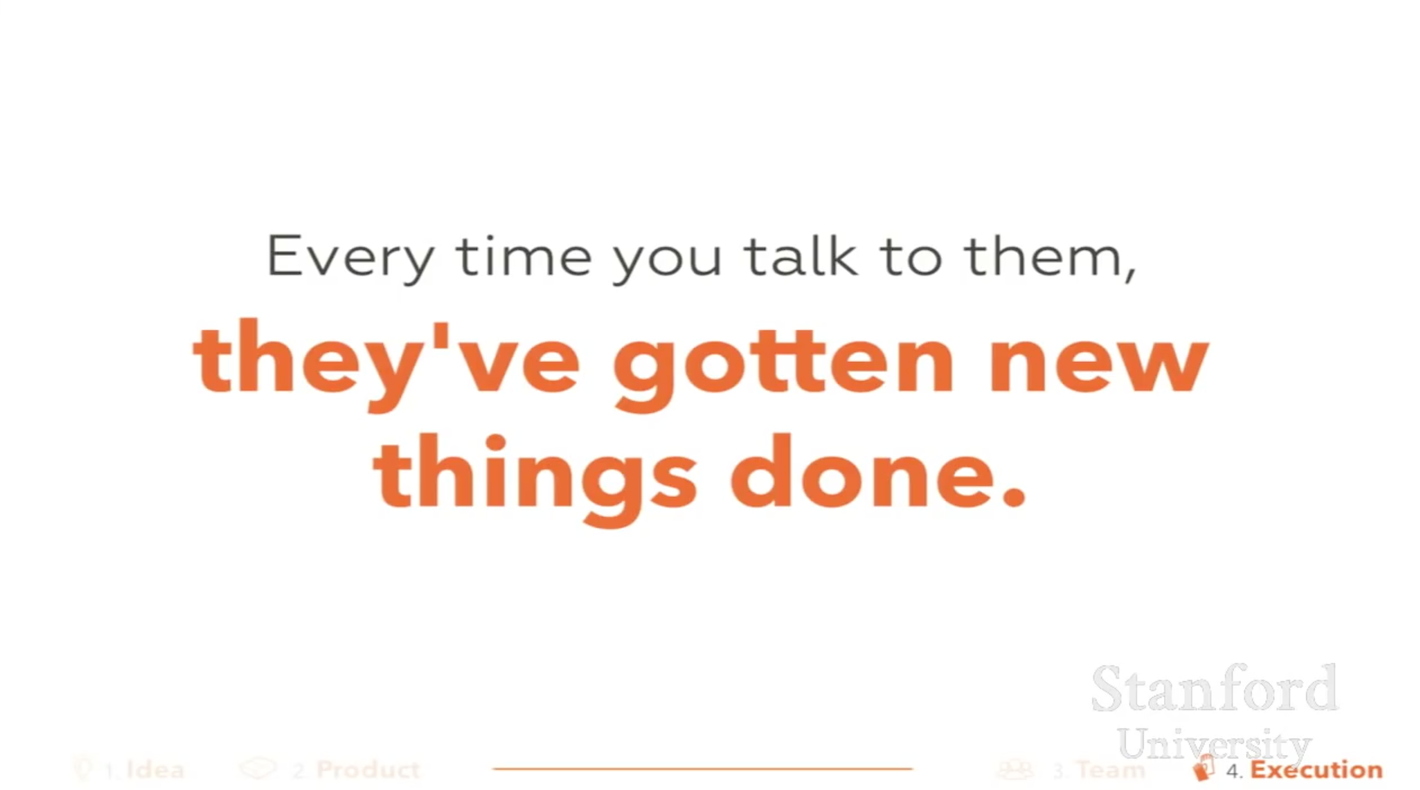
The best founders in their work are working on trifles, as it may seem from the outside, but these projects are developing really fast. Every time you meet with them - they have already done something new. Just this criterion is a good predictor of success within the YC framework. If at each meeting with the team we learn about the successful solution of new tasks, then we can talk about the harmonious development of this team.
The fact is that you can cope with significant problems, breaking them into small tasks. Solving such problems one by one, for example, throughout the year, you will not notice how “you move mountains”. On the other hand, if you just disappear for a year with the determination to return at one fine moment with a ready-made solution to all the problems, you can not really hope for anything amazing.
Thus, you should measure the amount of work required for the implementation of a project. Even if you are working on a crazy project in the field of synthetic biology, and it takes you a whole year to get things moving, even in this case you can try to break big tasks into more compact ones.
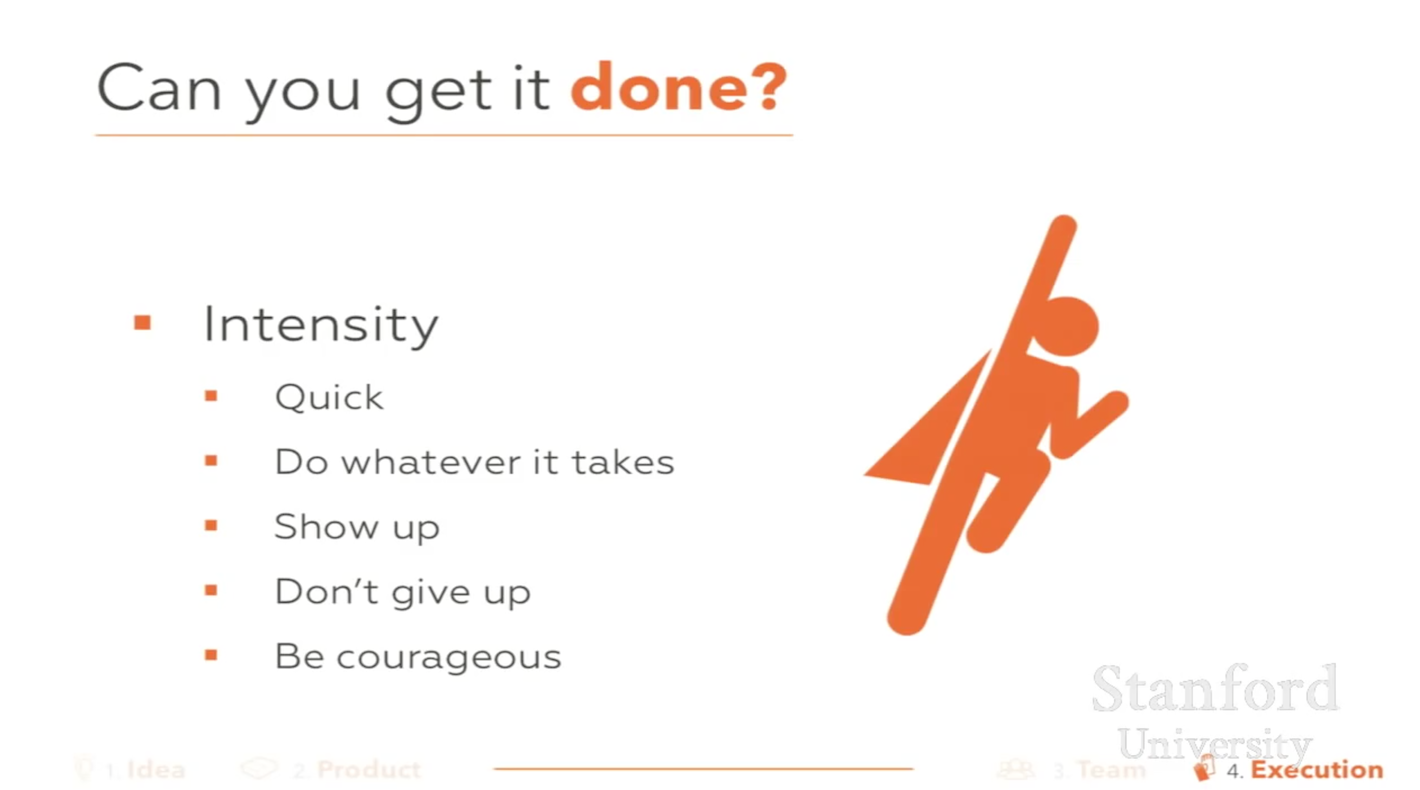
Work speed is one of the key qualities. Successful founders of companies usually respond very quickly to letters and make decisions quickly. Plus, they are ready to develop at any cost.
They are always in place at the right moment. Whether meeting or something else - they always participate in one-on-one discussions.
The following rule has always worked for me: getting on a plane and seeking a personal meeting if a critical situation arises somewhere. Let me tell you a little more about this.
Once, when I was working in my own company, we realized that we were about to lose the opportunity to close the deal. The transaction itself was quite significant, because it implied cooperation with the largest customer in our field. The contract has almost gone another company that entered the market a year before ours. They had everything under control.
We called the customer and said the following: “Our product is better, we need to meet.” To which they gave the expected answer: "Tomorrow we will sign a contract on this issue, sorry." We went to the airport, boarded a plane and arrived at the customer’s office by 6 am the next day. Being there, we refused to leave the office and asked someone from the customer to talk with us. In the end, one of the younger employees listened to our proposal, and then we met with his senior colleague.
It all ended with a break in the customer's contract with another company and the conclusion of this transaction with us literally next week. I am convinced that only personal presence helped us to resolve this situation in our favor.
So, speaking of the importance of personal communication, many cite a similar example with an airplane, but the point is not in the actual flights, but in the essence of the approach itself. As a good illustration, I cited this story.
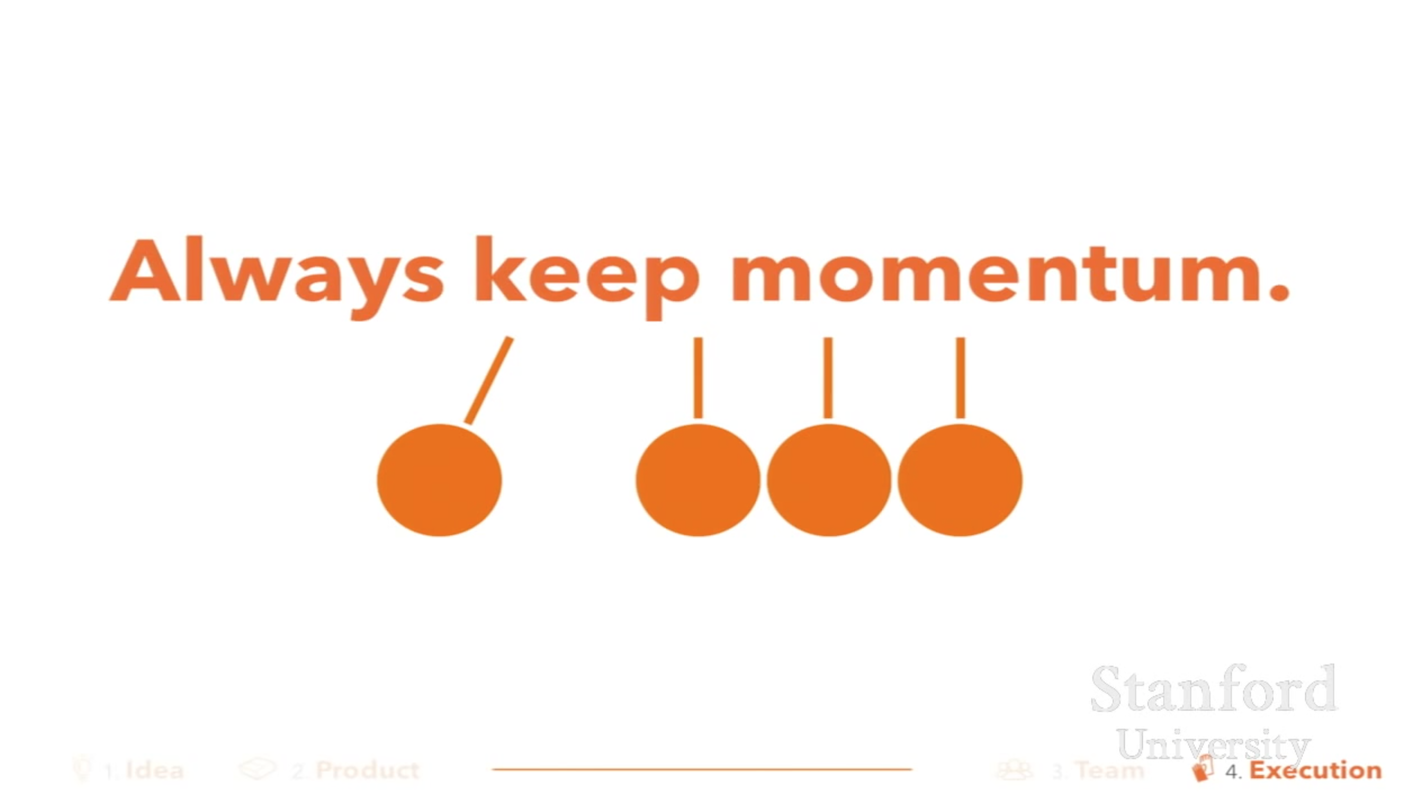
I have already spoken about the driving force and growth of the business earlier, but I will emphasize once again the fact that the life force of startups is in them. Successful implementation depends on these factors. Your company must constantly be at the peak of its capabilities, and if you take your foot off the gas pedal for just a second, everything will get out of control and turn into a snowball of problems.
The winners are fueled by the victorious spirit and continue to win, and the losers are constantly faced with a lack of motivation and lose again and again.
Always pay attention to the driving force of your business. This is a key aspect in the work on a startup. And if we give advice on the management of the company, then the founders should focus their attention on this.
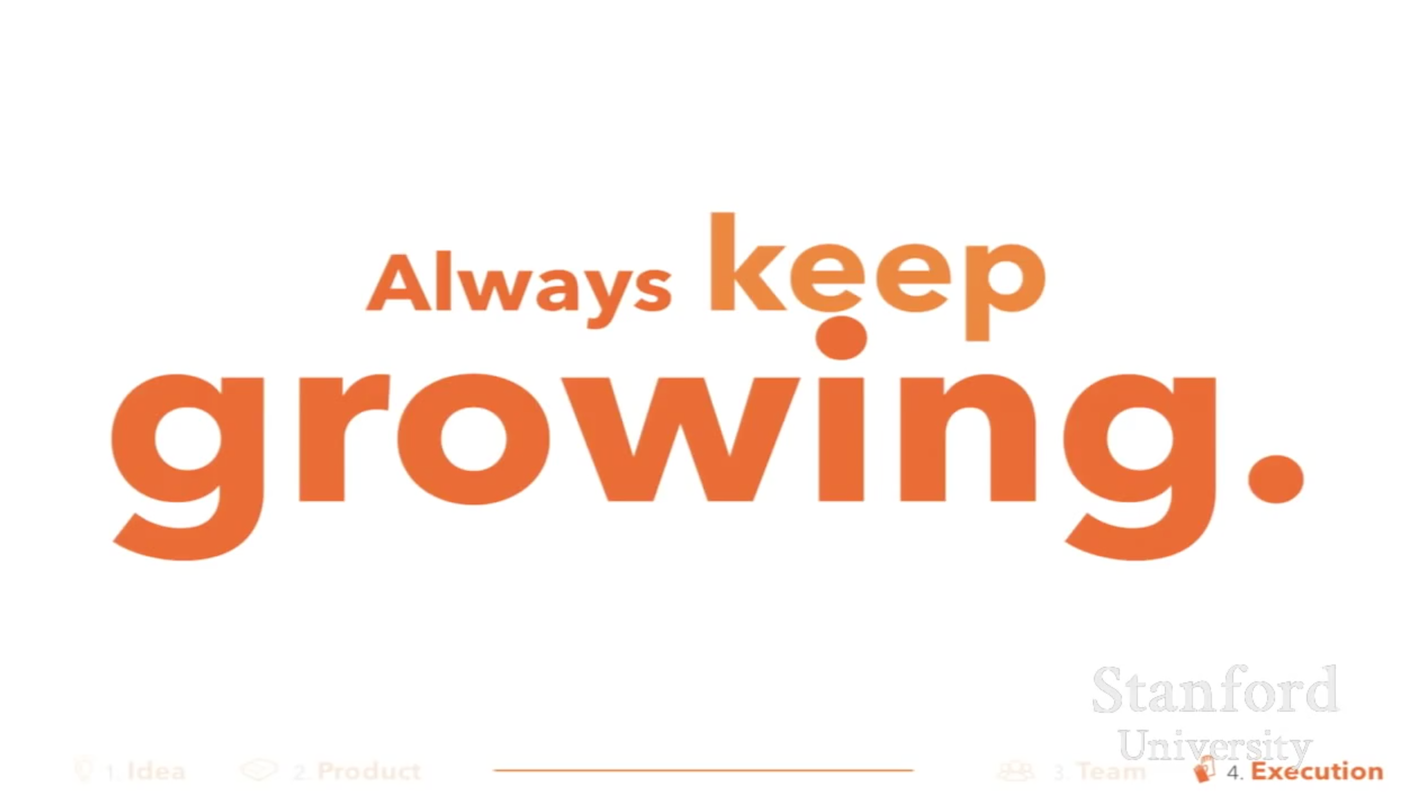
For most software projects, this thesis is transformed into a demand for constant growth. For startups that manufacture physical objects, for example, gadgets - in compliance with the schedule of product delivery. We are talking about this to YC resident companies, they listen to us, and everything is going well. At the end of the YC program, their concentration is dissipated into a number of other issues, and the growth of companies slows down. Realizing this, many lose their motivation and leave the projects. Everything just falls apart.
Of course, it is rather difficult to develop some kind of universal “engine of growth”, for constantly new approaches to achieving business growth appear, but there is one fundamental point: if you make a good product, then the business will grow. Concentration of efforts on the product at the initial stage of work will allow you not to lose the speed of business growth in the future.
In the case of a loss of growth, many try to immediately compensate for them, but they do not do it very correctly. They concentrate on long speeches about the company's vision and try to plug all the holes with their own proverbs. However, employees who feel a weakening business growth rate are not inclined to listen to such speeches.

Ballads about the vision should be reserved until the moment when you start winning one victory after another. While things are different, you need to try to win at least local victories.
One of my colleagues says that sales help to cope with almost any problem within a startup. He is absolutely right. You should identify areas where you could quickly get your way, and you do not have time to blink an eye, as all problems disappear by themselves.
In moments of slower growth, you will also encounter disagreements regarding the further actions of the team. In such cases, it is worth contacting your users, using their opinion as an alternative to endless disputes within the team. It is necessary to constantly remind people that there is no personal dislike between you, even if something does not work as we would like, you just need to pull yourself together and everything will work out. The recognition of this fact will help you in solving problems.
Using the example of Facebook once again, I will say that at the time of the company's slowdown in 2008, Mark [Zuckerberg] established a special department, whose duties included resolving this problem. The guys from this department concentrated on working on small tasks that could affect the growth of the entire company. Although the department consisted of a small number of employees, they managed to straighten out the Facebook growth curve. At the same time, the status of the department itself has grown. Mark called him one of the most innovative finds of the company. As my friends, who worked at Facebook at that time, say, this department really changed the growth dynamics of the whole company. And the fading team of the company again found the spirit of winners.
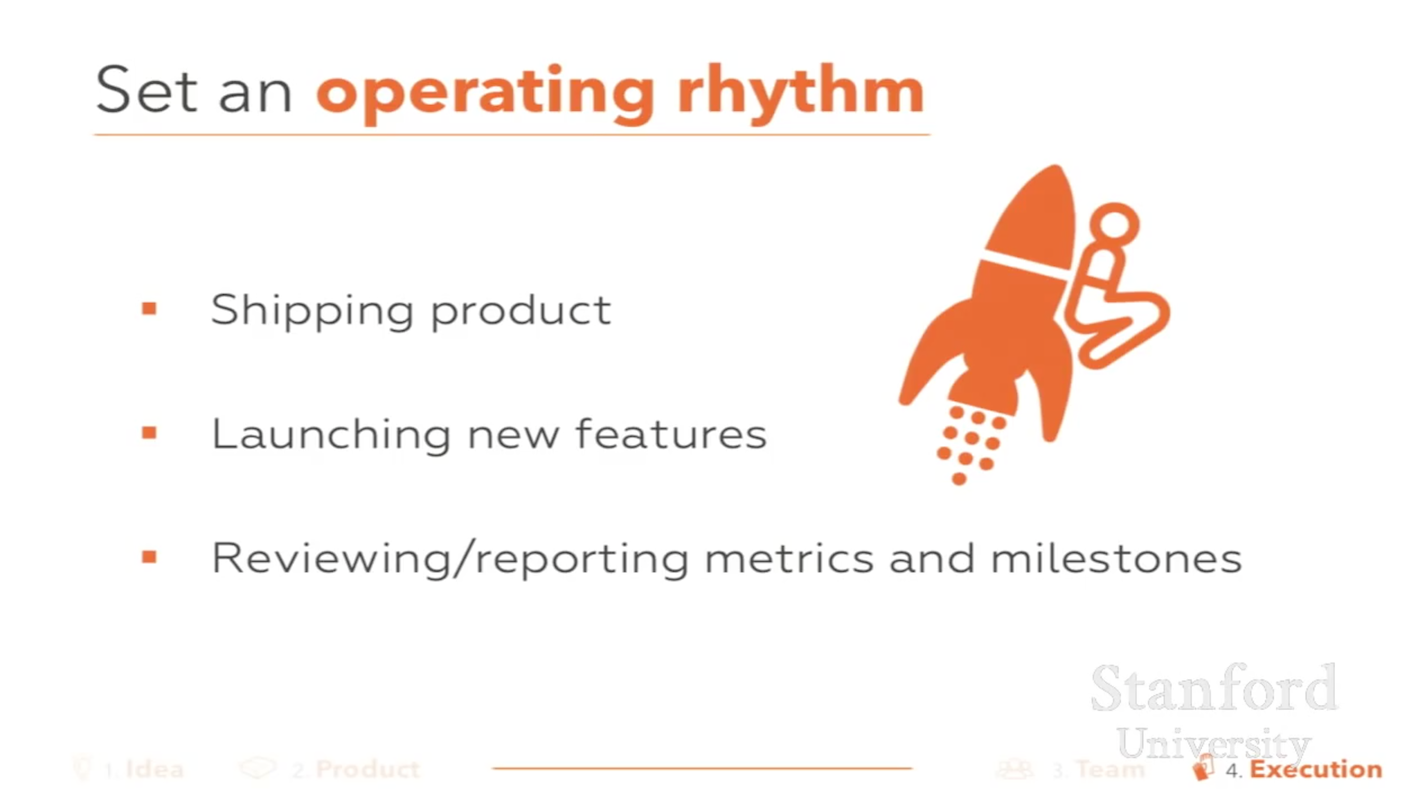
So, the working rhythm formed at an early stage serves as the engine of growth for the company and throughout its subsequent development. This is a regular update of the product and its functionality and evaluation of business life metrics on a weekly basis. The board of directors of the company will help you with metrics, which, although rarely, makes a tangible contribution to the strategic development of a business, it will certainly help to focus on metrics and the achievement of key stages of its development.
A critical factor that often undermines the growth of a company is news from competitors. This factor is external and always has a noticeable effect on the company.
However, there is a good approach to this issue: just do not worry about competitors until they affect your business directly with a product that competes successfully with yours. Press releases are written much faster than software code, and creating a good product is even more subtle. Try to remind the whole team about this - it is your task as the founder of the company - not to put the entire business at risk after reading good news from competitors.

I like one of Henry Ford's quotations: “It’s worth being afraid of those competitors who don’t think about you at all, only doing business to improve their own business.” In practice, such companies are almost never those who issue large, purely press releases. Usually these guys just bore everyone.
[ Translation of the next lecture by Paul Graham]
Source: https://habr.com/ru/post/242347/
All Articles